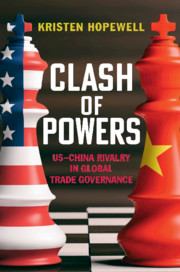Book contents
- Clash of Powers
- Clash of Powers
- Copyright page
- Contents
- Figures
- Tables
- Acknowledgments
- Introduction
- 1 The Doha Round Impasse
- 2 The New Politics of Agricultural Subsidies: A US–China Battle
- 3 The Dragon in the World’s Oceans: Fisheries Subsidies
- 4 Beyond the WTO: Erosion of the Export Credit Arrangement
- 5 Negotiating in the Dragon’s Shadow: Export Credit for Coal Plants
- Conclusion
- Notes
- References
- Index
Conclusion
Published online by Cambridge University Press: 21 January 2021
- Clash of Powers
- Clash of Powers
- Copyright page
- Contents
- Figures
- Tables
- Acknowledgments
- Introduction
- 1 The Doha Round Impasse
- 2 The New Politics of Agricultural Subsidies: A US–China Battle
- 3 The Dragon in the World’s Oceans: Fisheries Subsidies
- 4 Beyond the WTO: Erosion of the Export Credit Arrangement
- 5 Negotiating in the Dragon’s Shadow: Export Credit for Coal Plants
- Conclusion
- Notes
- References
- Index
Summary
The American hegemon’s ability to exercise power in and through international institutions has been sharply constrained by the rise of China. China has consistently thwarted US efforts to construct new global trade rules, producing a recurrent deadlock across a wide range of different areas of global trade governance. The rise of China and its resulting clash with the US is blocking global rule-making in trade and undermining the institutions designed to prevent global trade wars. The China paradox—the fact that China is both a developing country and an economic powerhouse—has created significant challenges for global trade governance. The issue of whether, and how, the rules of the multilateral trading system will apply to China is proving to be a difficult and intractable source of conflict. While China demands exemptions from global trade disciplines as a developing country, the US refuses to extend special treatment to China and insists on universal rules and reciprocal concessions. This fundamental conflict over how China should be treated in the multilateral trading system, which has paralyzed global rule-making in trade, has profound implications—not only for the governance of global trade, but also for pressing issues related to global development and environment.
Keywords
- Type
- Chapter
- Information
- Clash of PowersUS-China Rivalry in Global Trade Governance, pp. 191 - 202Publisher: Cambridge University PressPrint publication year: 2020

